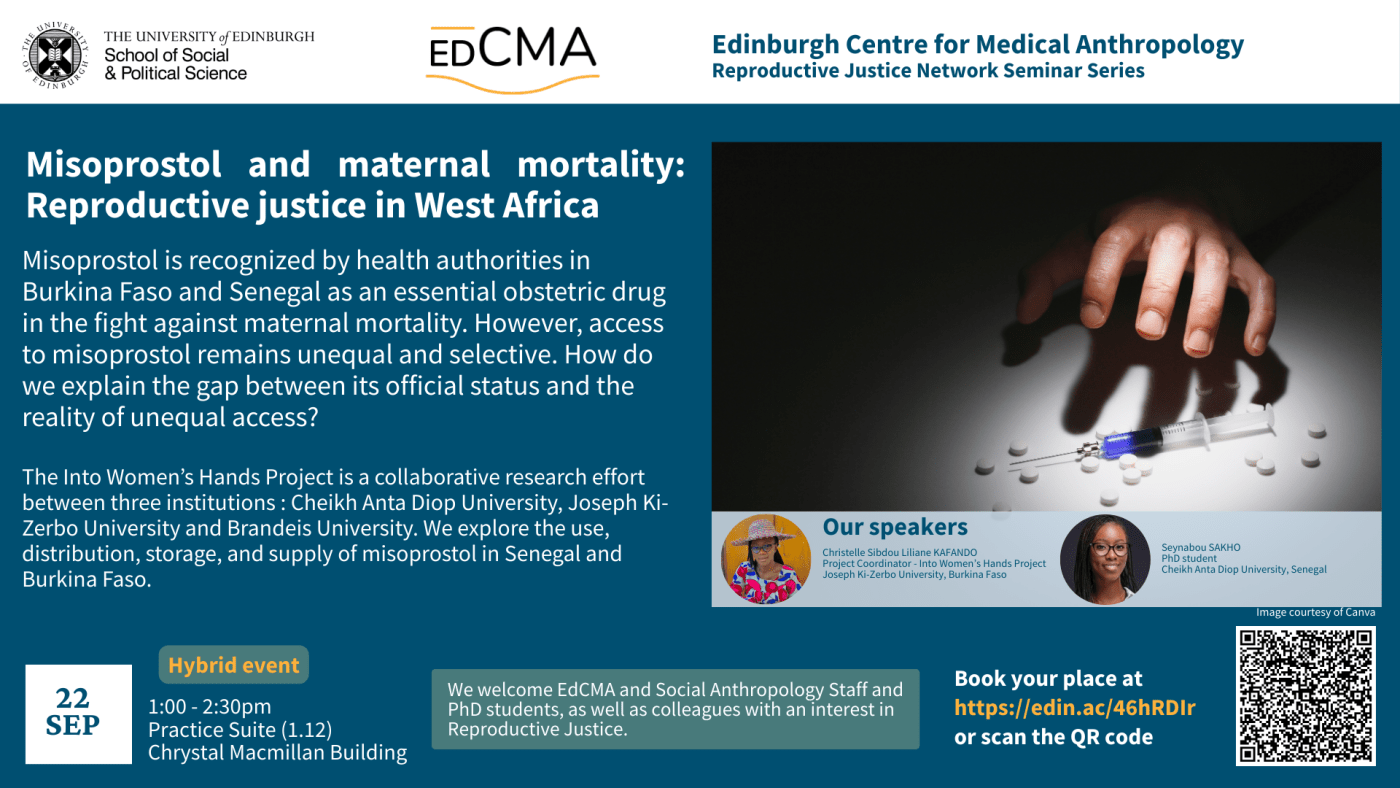Misoprostol & Maternal Mortality: Reproductive Justice in West Africa
Venue
Room 1.12 (Practice Suite), Chrystal Macmillan Building, The University of Edinburgh15a George Square, Edinburgh, EH8 9LD
Media
Image

Description
Misoprostol is recognized by health authorities in Burkina Faso and Senegal as an essential obstetric drug in the fight against maternal mortality. However, access to misoprostol remains unequal and selective. How do we explain the gap between its official status and the reality of unequal access?
Originally marketed to treat gastric ulcers, misoprostol is now an essential drug for the prevention and treatment of postpartum hemorrhage, post-abortion care, and labor induction. At the same time, misoprostol's capacity to induce abortion, which is legally restricted in both countries, raises medical, legal, and moral controversies. Various policies and practices, both formal and informal, have been implemented to control the circulation of misoprostol and prevent its misuse for abortion. These restrictions, combined with social and religious norms governing female sexuality, create disparities in the way misoprostol is distributed and used. Women in precarious situations with limited social networks face difficulties in accessing misoprostol. Furthermore, stock-outs of misoprostol are not uncommon in public health facilities. In this context, reproductive justice is defined as access for all women to quality obstetric care, their ability to choose whether or not to have a child, and the reduction of structural inequalities in reproductive health.
The Into Women's Hands project is a collaborative research effort between three institutions : Cheikh Anta Diop University, Joseph Ki-Zerbo University and Brandeis University. We explore the use, distribution, storage, and supply of misoprostol in Senegal and Burkina Faso. We use an ethnographic approach based on in-depth interviews, direct observations, and mystery client studies conducted in official pharmacies and informal markets and with online vendors. Our project also has a pedagogical dimension, as it contributes to the hands-on training of research assistants through « learning by doing ».
This is a hybrid event (in-person and online). Attendees who have registered to attend online will receive the link to the seminar shortly in advance on the day. Please ensure you check your emails!
Please note that this event may be recorded. The recording will be used for internal University of Edinburgh teaching purposes only.
About our speakers:
Christelle Sibdou Liliane KAFANDO holds a Master's degree in sociology. Since 2022, she has been the project coordinator for the study “Into Women’s Hands: Misoprostol and the reduction of maternal mortality in Burkina Faso and Senegal” at the Institut Supérieur des Sciences de la Population (ISSP) at Joseph Ki-Zerbo University. Her research focuses on sexual and reproductive health, sexual and reproductive rights, and gender dynamics. Since 2015, she has conducted research at the Institute for Research and Development (IRD) in France and also at ISSP, where she has participated in various reproductive health studies, including the “Contraceptive Autonomy” project. She also contributed to the action research project “Responding to sexual violence against adolescents for greater respect for their sexual and reproductive rights in Burkina Faso” funded by the International Development Research Centre (IDRC). Christelle has participated in international conferences, including Women Deliver (Kigali, 2023) and Anthropology and the Black Experience (Dakar, 2025).
Seynabou SAKHO is a doctoral student at Cheikh Anta Diop University. Since 2022, she has held the position of project coordinator for the “Into Women’s Hands : Misoprostol and reduction of maternal mortality in Burkina Faso and Senegal” study in Senegal. As part of her Master’s thesis, she worked in the field of maternal health, analyzing how public health logics and social rationalities shape the follow-up of post-partum women in the region of Touba. Her doctoral thesis explores the relationship between the social and political governance of female reproduction and maternal mortality. She has coordinated several research projects, including the evaluation of UNICEF's “Wash and Clean” tool in maternity wards in the regions of Kaolack and Diourbel, the “Mass administration of dihydro-artemisinin-piperaquine and primaquine-based drugs” program in the region of Tambacounda, and the “Use of artificial intelligence in the fight against Covid19 in Senegal and Mali” with the Laboratoire de Sociologie d'Anthropologie et de Psychologie (LA.S.A.P), Dakar.
